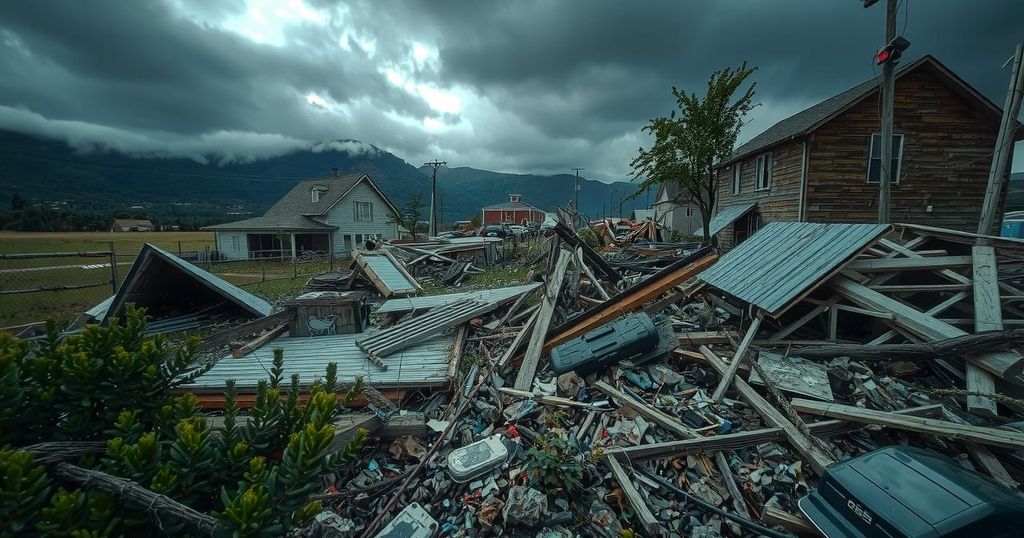The 2024 Atlantic hurricane season ended with 11 hurricanes, marking a significant increase compared to the average of seven. Major storms such as Hurricane Helene caused extensive damage and over 200 fatalities in the U.S., while Hurricane Milton recorded unprecedented wind speeds. Notably, climate change is influencing the formation and intensity of storms, highlighting growing environmental concerns.
The 2024 Atlantic hurricane season concluded on Saturday, marking a notably active period with 11 hurricanes, significantly surpassing the average of seven. This season led to immense devastation along the U.S. Gulf Coast, characterized by not only the physical damage incurred but also substantial loss of life. Meteorologists described this season as “crazy busy,” attributing the heightened activity to unusually elevated ocean temperatures that fostered hurricane formation and intensification far earlier and later than typical.
Among the hurricanes, Hurricane Beryl emerged distinctly as it formed in early June, becoming the first recorded Category 4 hurricane for that month, striking Carriacou in Grenada. Following its impact on Jamaica, the storm resulted in severe destruction of crops and infrastructure, claiming two lives. Furthermore, Beryl escalated to a Category 5 hurricane on July 1, significantly earlier than the usual September 1 occurrence of such major storms in the Atlantic.
In September, Hurricane Helene wrought catastrophic destruction across the southeastern United States, marking the deadliest storm to strike the U.S. mainland since Hurricane Katrina in 2005. The storm resulted in over 200 fatalities and an estimated $48.8 billion in damages, with widespread impacts noted in North Carolina, Florida, Georgia, and other states.
October witnessed Hurricane Milton, which rapidly intensified, achieving unprecedented wind speeds of 180 mph, ranking it among the strongest hurricanes recorded in the Gulf of Mexico. Areas impacted by both Helene and Milton experienced rainfall levels that tripled usual amounts for September and October, establishing these months as the wettest on record for regions such as Asheville and Orlando.
Lastly, Hurricane Rafael approached a historical wind speed of 120 mph in November, almost equaling the strongest November hurricane record in the Gulf, striking Cuba during its recovery from Hurricane Oscar. This season underlines the growing impact of climate change, with researchers noting that rising ocean temperatures allow for unpredictable intensification of hurricanes during atypical periods. \”In other words, we never had a storm as strong as Beryl so early in the season anywhere in the Atlantic and we never had a storm as strong as Milton so late in the season in the Gulf of Mexico,\” stated Brian McNoldy, a hurricane researcher.
The Atlantic hurricane season is a period marked by increased tropical cyclone activity in the Atlantic Ocean, typically spanning from June 1 to November 30. This phenomenon is significantly influenced by environmental factors, particularly rising sea surface temperatures, which contribute to the intensity and frequency of hurricanes. In recent years, climate change has been posited as a key factor leading to the realization of unprecedented weather patterns, impacting both the timing and intensity of storms. The 2024 season was particularly notable for its high number of hurricanes and significant rainfall, causing extensive damage over large areas and heightening concerns regarding the implications of climate change on future weather patterns.
In summary, the 2024 Atlantic hurricane season was characterized by an unprecedented number of destructive hurricanes, causing extensive damage and loss of life across the region. The season’s anomalies, including the early formation of Hurricane Beryl as a Category 4 and Hurricane Helene’s deadly impact, underscore the profound changes driven by climate change on weather events. The stark contrasts in storm intensification and tendencies challenge traditional expectations and reinforce the need for ongoing research into the broader implications of human-induced climate change on hurricane activity.
Original Source: www.wtvr.com







